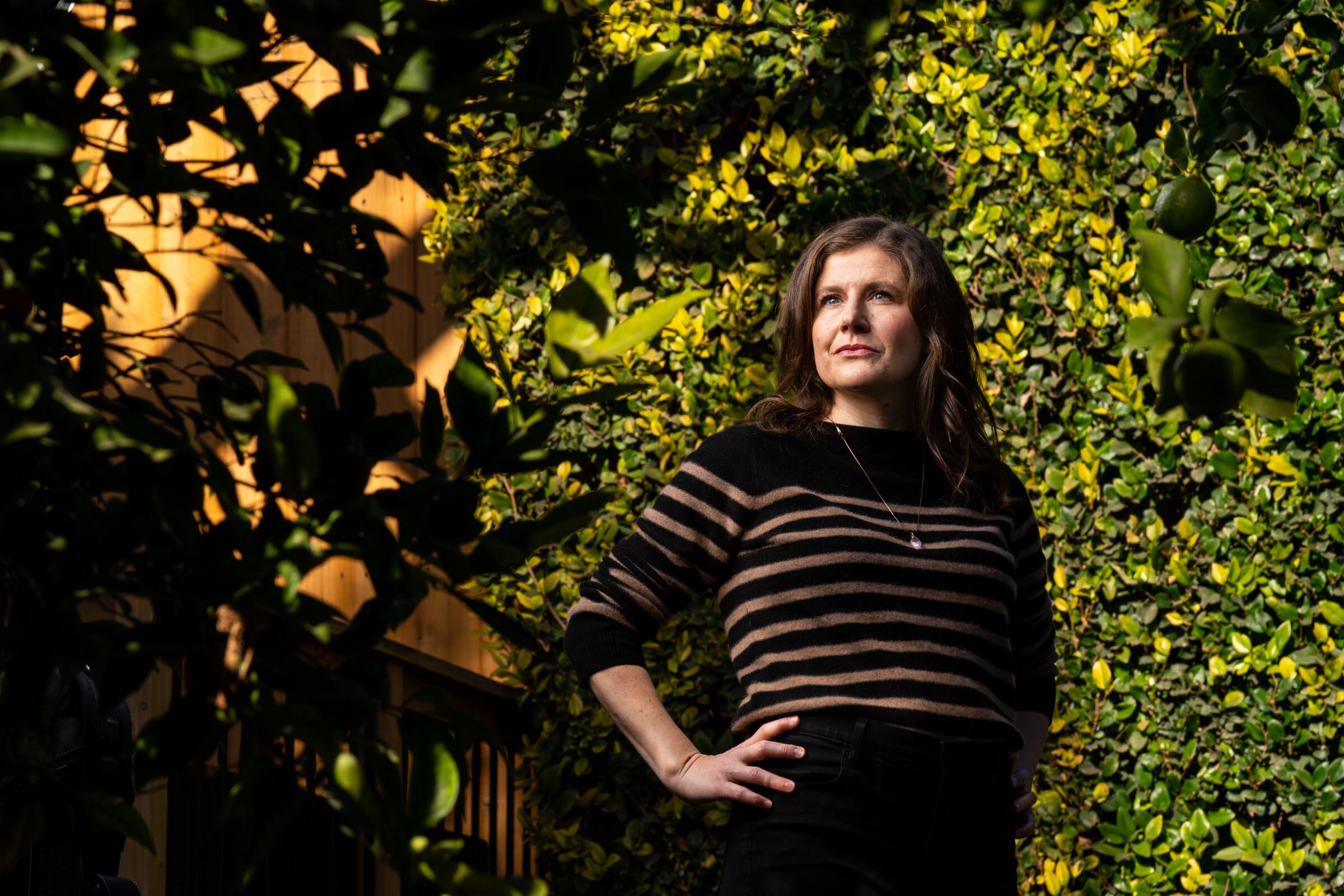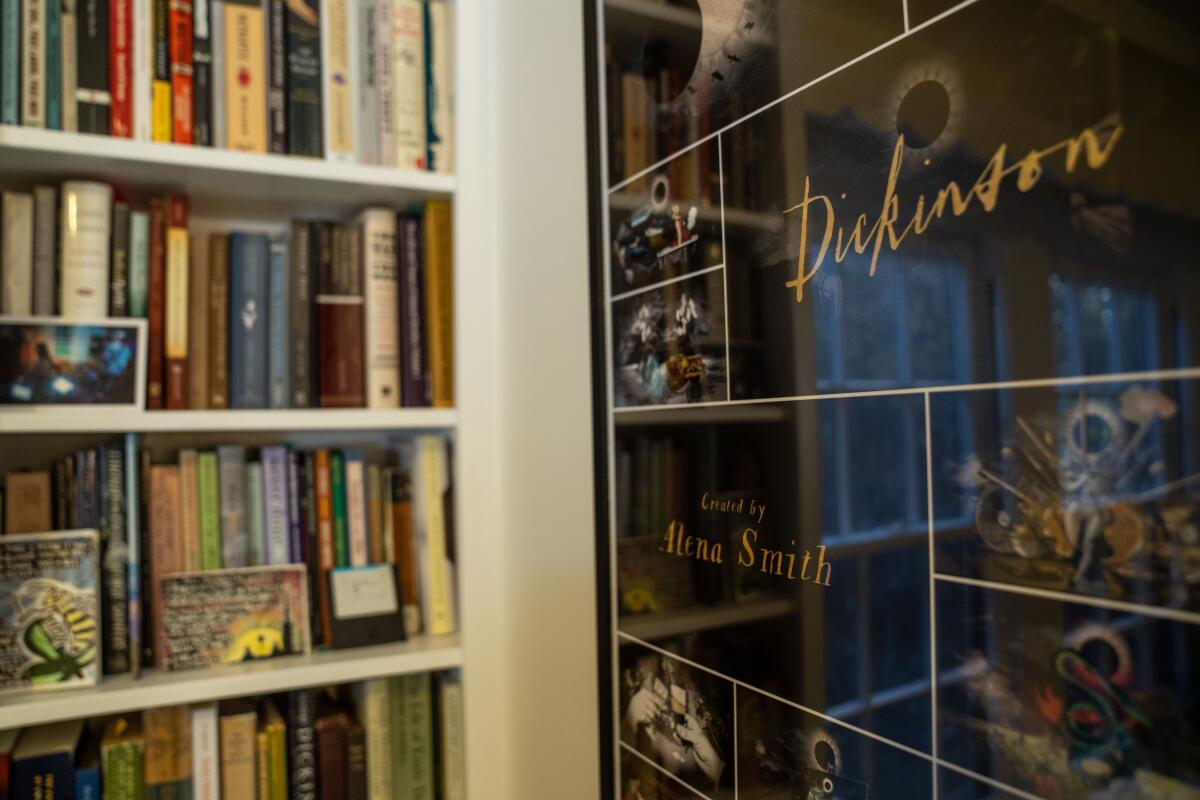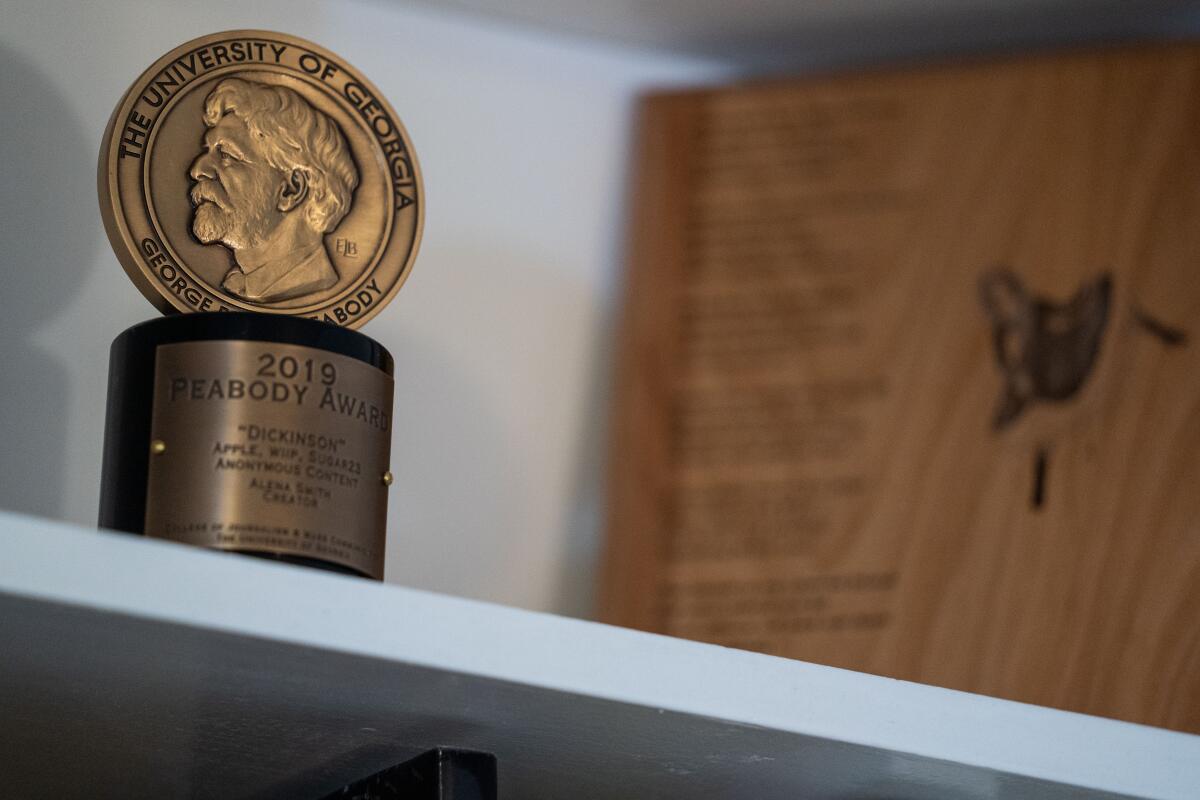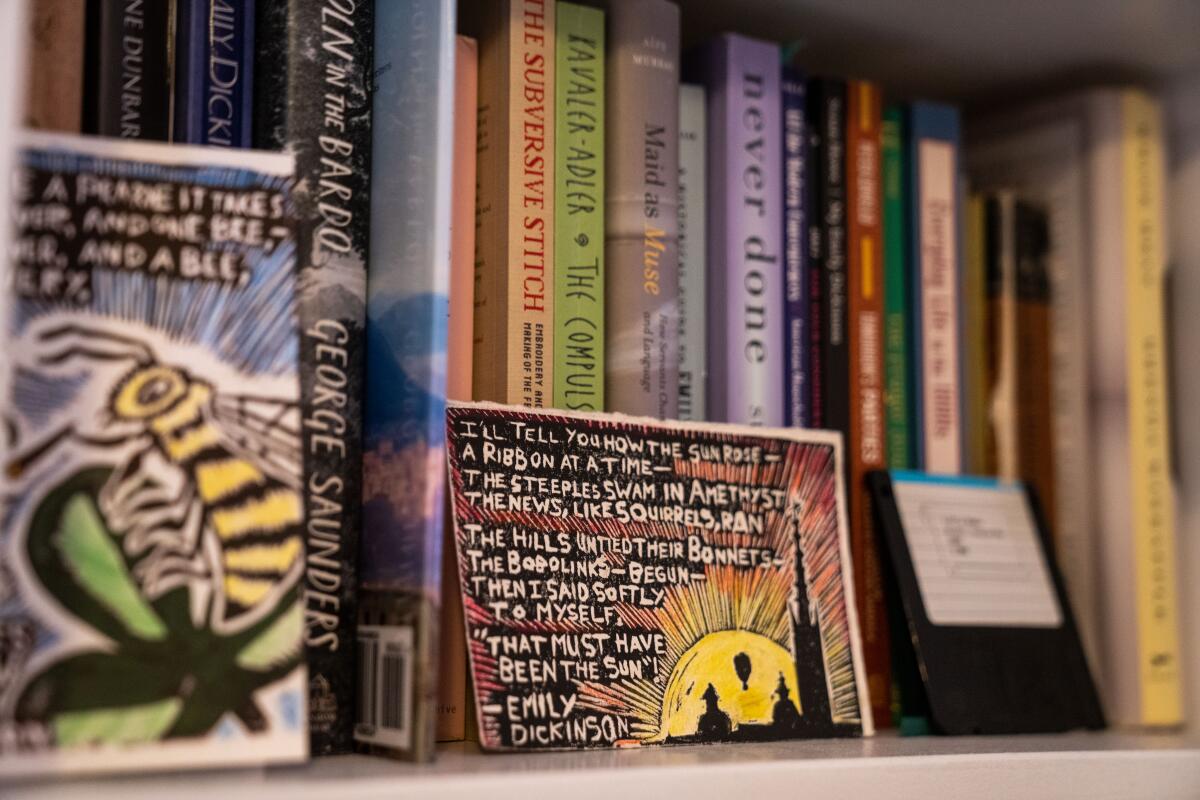The complete guide to home viewing
Get Screen Gab for everything about the TV shows and streaming movies everyone’s talking about.
You may occasionally receive promotional content from the Los Angeles Times.

There’s no handbook that explains how to stay focused while working from home on a key project, during a pandemic, two days after an insurrection at the U.S. Capitol.
But Alena Smith managed the best she could.
Just before the return of “Dickinson,” Apple TV+’s quirky and audacious coming-of-age tale featuring 19th-century poet Emily Dickinson, creator and showrunner Alena Smith, like many Americans, watched the siege unfold on TV. And tweeted about it. And, because of it, she couldn’t exactly keep her attention on work, which included prepping for the premiere of Season 2 and working on the Civil War-set third season.
“Our whole lives now take place online. I’m not leaving my room. And I’m toggling back and forth between the insane events of our world and this launch of Season 2 that I’ve been waiting [on] for so long,” she said. “I just hope that for the people who are finding the show and enjoying it right now, that it’s some kind of balm. That’s kind of the most sustaining feeling right now: having a show that can be a kind of communal space.”
Since the show’s debut, Smith has said her goal with the anachronistic, sometimes hallucinogenic, comedy is to play with the details of Dickinson’s life, and the themes that emerged in her writings, to reflect on the realities of today. The events of 2020, she said, had an influence on Season 3, which was largely written during the summer and fall. (More on that later.) But for now, the show is focused on stardom.
The series, which features Hailee Steinfeld as the literary figure in her 20s, spent much of the first season exploring how patriarchy — mainly, the conservative views held by the poet’s father — stifled Emily’s aspirations to become a published writer. The second season considers how Emily’s ambivalence about fame may also have been a factor in why the majority of her work, now revered, dissected and sometimes memorialized in perfectly composed Instagram posts, was largely unpublished in her lifetime.
From her Los Angeles home, where she’s been riding out the COVID-19 pandemic with her husband and her 2 ½-year-old twins, Smith spoke over video conference about unpacking Dickinson using literary theory, challenging romance expectations and her favorite Dickinson poem.
The interview has been edited for clarity and condensed.
“Dickinson” from Apple TV+ is a pointed love letter to an American icon, rebel spirit fully intact.

The thrust of the new season is Dickinson’s struggle with the idea of notoriety, a subject she ruminates on in poems like “Fame Is a Fickle Food” — the title of the second episode. For Emily, it becomes a consuming paradox when she’s faced with having her work published in a newspaper after her friend Sue (Ella Hunt) introduces her to Sam Holmes (Finn Jones), an editor.
We wrote about fame in this season because it is a central theme of Emily Dickinson’s work. I am approaching Dickinson much more from a literary theory perspective than a biography. From a literary theory perspective, you can ask the question: What does her body of work have to say about fame? And what do the strategies that she used as a writer, which are often a complex blend of showing up and hiding, what does that mean for that to be the drive of someone? Many, many, many stories have been told that are like: “I’m a young artist, and I’m going to go to the big city and make it.” And in a way, this is our version of that story for this character of Emily Dickinson. And it’s funny because, in a way, the big city is just Sue and Austin’s house next door and all the VIPs.
Emily is torn in both directions. She’s not just this figure of externalized ambition — “I’m gonna go to the big city and make it and put my name out there.” She wants to do all that, but at the same time that can also become her worst nightmare and she wants to run all the way back to her bedroom and shut the door and not be seen by anybody. To me, that’s the tension that makes her such a fascinating figure, both biographically and in her body of work.
What fame meant to Emily in the 1850s is the same, in certain ways, as what it means to us now. All of us right now experience these issues about visibility and being seen and broadcasting our own lives on steroids. And now the pandemic has kicked that up by a million because now we only exist online, we only exist in the projections that we put out of ourselves. But, also, it has felt as if there has been a flattening of the curve. We’ve all gotten used to seeing celebrities on Zoom. It’s an interesting time to be looking at a figure like Emily — biographically, but also the character that Hailee plays in our show. She is wrestling with this question of fame and asking: What’s wrong with being a nobody? In fact, is there power in anonymity? Is there power in invisibility?
“Dickinson,” on Apple TV+, is the latest in a spate of historical comedies on film and TV to reimagine the period piece.
The nature of Dickinson’s relationship with Sue Gilbert, her childhood best friend who later married her brother, has been the source of much scholarly intrigue. They lived next door to each other in their adult years. In “Dickinson,” the romance between the pair is hardly vague, but nevertheless remains complicated.
Here we have a real historical relationship. If people want spoilers: Spoiler, they lived next door to each other for their entire lives and Emily wrote unbelievable love poems to her. And I find it funny because every day on Twitter, I’m getting fans who are like: Can you make them end up together? And I’m like, you can make them end up together. Because what does it mean?
I really love it. It always challenges the meaning of what does it mean to have a happy ending? What does it mean to end up with someone? Even in a marriage, there’s oscillating times of closeness and distance. I’ll also quote our wonderful director, Silas Howard, who directed four episodes in Season 2 and is coming [on] to be our producing director in Season 3. He said, “If you want unrequited love, you can’t do better than falling in love with your brother’s wife.” [Emily and Sue] are the most amazing combination of utterly doomed and tragic, but also, you can’t get a happier ending — I love you, you inspire me, and we get to always live next door to each other and write to each other and take care of each other, and we’re family.
And in terms of the categories of gay and straight — by now, I’ve had all these people attack me for saying she’s gay or I’ve had people attack me for not making her gay enough.

Smith spent much of last year working on the third season of the half-hour comedy, conducting a writers room over Zoom. Production is expected to begin in the spring.
There’s definitely been so many uncanny ways in which the premise of this show, which uses the 19th century in America to look at where we are today, has just become, at times, overwhelmingly, painfully acute. Certainly, when we were in our writers room of Season 3, which was over the summer, that was during the significant protests and uprisings around the death of George Floyd.
I’ve spent quite a lot of time thinking about, and living with the ways that America has not successfully confronted the trauma of the past and that is what “Dickinson” is about. When I pitched the show, we knew that it was leading up to the Civil War. I guess I would say the central theme of Season 3 is: If you can’t look honestly at your past, you cannot go to a better future. And that feels like that’s what’s true about our country right now and that’s the whole reason for doing a kind of experimental period show.
When Smith pitched “Dickinson” to Apple executives, she came armed with a three-season plan. But does Smith, who recently signed a multiyear overall deal with Apple, expect to end the series after next season?
When there was this three-season plan in the pitch, it was to assure Apple that like, yes, there were three seasons’ worth of story about Emily Dickinson [to tell] because that’s not necessarily something that anyone would believe. I think that I’ve designed Season 3 so that it would, I think, be a satisfying conclusion. But I think in this world, you never know. You just never know. And there’s more to tell because Emily is such a rich well of important and relevant themes. But I will also say that I’m looking forward to making a show that’s not about Emily Dickinson. Listen, I love this so much, but I think there was definitely also a perception that I wrote the show only because I was only an Emily Dickinson person and that’s totally not true. I would like to write something that’s not period and not biographical. We’ll see.
Many of the best films and TV shows of 2020 — and buzziest titles of 2021 — have roots in theater: The industry’s survival is Hollywood’s responsibility too.

Before she was creating singular TV moments — like having a fictional Emily Dickinson chill with Death, as personified by rapper Wiz Khalifa, in a ghostly horse-drawn carriage — Smith’s storytelling unfolded on stage. She received her MFA in playwriting from the Yale School of Drama and has written a number of plays, including “The New Sincerity,” “The Bad Guys,” and “Plucker,” in between her work on shows like “The Newsroom” and “The Affair.” Her play “Icebergs” premiered in 2016 at the Geffen Playhouse in Los Angeles.
I think that what led me to want to be a playwright was this same thing that makes me able to be a showrunner. Being a writer is a very lonely act, but when you write for performance, when you write something for production, you’re doing something alone that leads to something together. There’s always this odd push and pull, the urge to withdraw versus the urge to connect. For me, the most gratifying experiences are shared creative acts — that fundamentally can mean writing a part and having an actor discover a part of themselves through this investigation you’ve done internally as the writer. But it can also mean working with a costume designer and finding the right piece of wardrobe for someone to wear. I do feel like putting on a play or having a TV show is sort of like throwing a party and you’re the host and you have to make sure everyone is having a good time. Enacting human relationships in real time is what drew me to the stage. And then the pivot to television really happened because I needed to make money. And television was going through this profound metamorphosis , which is still underway and, if anything, is just accelerating right now.
Even just today I got sent some audition tapes for a new role in Season 3, and it’s all these people who are theater actors who used to audition for my plays in the year, like, 2005. There’s a nice community. We’ve been a community. I think right now, the question for everybody in the theater world is, how is it going to survive? I was so incredibly fortunate to have Lynn Nottage in the writers’ room in Season 3 of “Dickinson.” She was my playwrighting teacher [at Yale] and is one of our best living playwrights. I was trying to ask Lynn what is going to happen with theater and even she doesn’t know. It’s really rough.
Smith said her favorite Dickinson poem is the one that, without giving anything away, the season ends on: “You Cannot Put a Fire Out.”
You cannot put a Fire out —
A Thing that can ignite
Can go, itself, without a Fan —
Upon the slowest Night —
You cannot fold a Flood —
And put it in a Drawer —
Because the Winds would find it out —
And tell your Cedar Floor —
I think it’s so resonant for our time, you know, to think about the fire of a movement, the fire of an individual artist, the fire of love — you can take it any way that you want. I just love that idea. It feels prophetic, it feels direct and passionate and spooky and alive. I love it. I love [the] idea that when she wrote, she was saying: You can’t stop me, you can’t stop the force of this work.
‘Dickinson’
Where: Apple TV+
When: Any time
Rating: TV-14 (may be unsuitable for children under the age of 14)
The complete guide to home viewing
Get Screen Gab for everything about the TV shows and streaming movies everyone’s talking about.
You may occasionally receive promotional content from the Los Angeles Times.